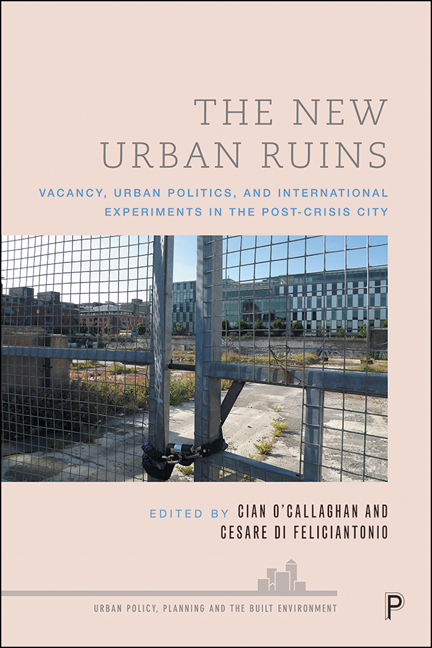Book contents
- Frontmatter
- Contents
- List of figures and tables
- Notes on contributors
- Acknowledgements
- Introduction
- PART I Rethinking ruination in the post-crisis context
- PART II The political economy of urban vacant space
- PART III Reappropriating urban vacant spaces
- Conclusion: Centring vacancy – towards a research agenda
- Index
13 - Tracing the role of material and immaterial infrastructures in imagining diverse urban futures: Dublin’s Bolt Hostel and Apollo House
Published online by Cambridge University Press: 13 May 2022
- Frontmatter
- Contents
- List of figures and tables
- Notes on contributors
- Acknowledgements
- Introduction
- PART I Rethinking ruination in the post-crisis context
- PART II The political economy of urban vacant space
- PART III Reappropriating urban vacant spaces
- Conclusion: Centring vacancy – towards a research agenda
- Index
Summary
Introduction
This chapter focuses on the rise of radical actions as a response to the extreme austerity implemented by the Irish government after the global financial crisis of 2008. Globally, the presence and visibility of vacant spaces in urban sites contributed to their use by activists to imagine alternative futures (DeSilvey and Edensor, 2013; Németh and Langhorst, 2014; Ziehl and Oßwald, 2015). There has been an increase in using occupation-based practices as strategies to claim space and achieve political goals (Vasudevan, 2015, 2017; Wood, 2017). After the financial crisis, Ireland's landscape was littered with vacant buildings and ghost estates – the ‘new ruins of Ireland’ (Kitchin et al, 2014). These ruins were physical reminders of ‘everything that had gone wrong with Ireland’ (Hosford, 2017). As Hearne et al (2018: 154) insightfully argue, ‘activism has been shaped by, and has acted as a response to, the main characteristics of each period and the different crises generated by them’. Ireland faced a ‘tsunami of austerity’ (Hearne, 2014: 18), resulting in a housing and homelessness crisis, with over 9,000 homeless people in April 2020 (Focus Ireland, 2020). As a response, there was an increase in movements in Ireland that used housing and occupation as strategies for political action (see also the chapter by Di Feliciantonio and O’Callaghan, this volume).
In the post-crisis period, vacant spaces and the urban landscape in Dublin were resources that helped politicise urban actors and supported activist interventions (Di Feliciantonio and O’Callaghan, 2020). At that time, many diverse groups emerged at the grass-roots level and combined to form a politicised housing movement. The Irish Housing Network (IHN) is the most salient example of this; in this chapter, I analyse two examples of their projects. The first is the Bolt Hostel (BH) in 2015, which was an occupation by activists of a former homeless shelter in Dublin's North inner city, which lay vacant at the time of occupation. The activists worked on fixing up the shelter to highlight the incongruity of increasing homelessness at the same time as widespread vacancy, opening it as an unsanctioned homeless hostel in July 2015. The activists left after just a few weeks in August 2015 due to legal action brought by Dublin City Council.
- Type
- Chapter
- Information
- The New Urban RuinsVacancy, Urban Politics, and International Experiments in the Post-Crisis City, pp. 229 - 242Publisher: Bristol University PressPrint publication year: 2021



